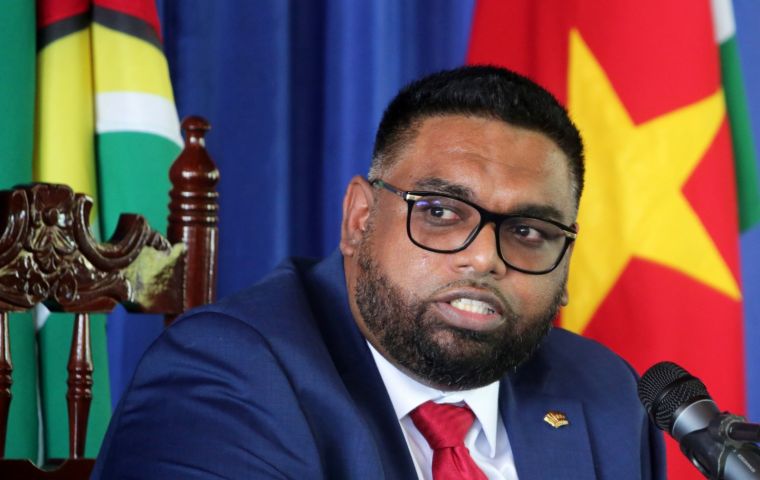MercoPress. South Atlantic News Agency
New ICJ ruling against Venezuela in Essequibo case
 “Guyana is confident that the court will uphold its long-standing international boundary with Venezuela,” Guyanese President Irfaan Ali said
“Guyana is confident that the court will uphold its long-standing international boundary with Venezuela,” Guyanese President Irfaan Ali said The Venezuelan administration of President Nicolás Maduro was dealt another international setback Thursday when the International Court of Justice (ICJ) on Thursday turned down new objections filed by Caracas regarding the territorial dispute with Guyana over the oil-rich Essequibo.
Guyana defends a boundary established in 1899 by an arbitration court in Paris, while Venezuela's claims are based on the so-called Geneva Agreement, signed in 1966 with the United Kingdom before Guyanese independence, which established the bases for a negotiated solution and disregarded the previous treaty concerning the 160,000 km2 territory.
The case is since 2018 in the hands of the ICJ, the largest UN jurisdiction based in The Hague.
The court “rejects the preliminary objection raised by the Bolivarian Republic of Venezuela” by 14 judges to one, ICJ Chief Justice Joan Donoghue announced, meaning the tribunal can now proceed to hearings on the merits of this dispute.
“Guyana is confident that the court will uphold its long-standing international boundary with Venezuela,” Guyanese President Irfaan Ali said in a statement. “Guyana has always been fully committed to the peaceful resolution of the dispute with its neighboring and sister republic in accordance with international law,” he added.
“Venezuela does not recognize the judicial mechanism as a means of resolution” of the dispute with Guyana, Venezuelan Vice President Delcy Rodríguez said, also in a statement which added that Caracas will “evaluate” the implications of the ICJ ruling “in an exhaustive manner” and “will adopt all measures at its disposal for the defense of its legitimate rights and territorial integrity.”
The dispute was reignited in 2015 when US oil giant Exxon Mobil found oil deposits off the coast of Essequibo, which is equivalent to two-thirds of Guyana.
The Venezuelan state argues that the area belongs to it because it was part of the Spanish Empire's Captaincy General of Venezuela and that the boundaries in South American countries were established under the “utis possidetis iuris” principle, which implies that they are entitled to the territory they had during the Colony.
Guyana, on the other hand, claims that the current border is valid due to the 1899 ruling, which Venezuela deems a “fraudulent arbitration” and insists that the 1966 agreement is “the only valid instrument to settle this dispute.”
The ICJ ruled in 2020 against Venezuela's objections that it had jurisdiction to analyze the dispute. The United Nations agreed in 2018 to have the case brought before the ICJ. While Caracas initially refused to attend its hearings, some representatives ended up attending.
“All member states of the United Nations, including Guyana and Venezuela, are obliged under the UN Charter to comply with the judgments of the courts,” said Ali on Thursday, who recalled that it is the “second time” that the ICJ rejects Venezuela's “jurisdictional objections.”
Meanwhile, in Caracas, opposition leaders such as Julio Borges, María Corina Machado, and Andrés Velázquez expressed their opposition to this ICJ decision but held the Maduro administration accountable for it.
“A serious government, responsible and responsive to the interests of Venezuela, would never have allowed this situation of real threat to our territorial integrity and National Sovereignty to be reached,” said Machado, the national coordinator of Vente Venezuela. She insisted that the Essequibo is a strategic and fundamental part of the country, therefore, after this ICJ ruling, the country must summon expert jurists to defend sovereignty.




Top Comments
Disclaimer & comment rulesCommenting for this story is now closed.
If you have a Facebook account, become a fan and comment on our Facebook Page!